An official website of the United States government
 United States Department of Labor
United States Department of Labor
Prepare incoming and outgoing mail for distribution for the United States Postal Service (USPS). Examine, sort, and route mail. Load, operate, and occasionally adjust and repair mail processing, sorting, and canceling machinery. Keep records of shipments, pouches, and sacks, and perform other duties related to mail handling within the postal service. Includes postal service mail sorters and processors employed by USPS contractors. Excludes "Postal Service Clerks" (43-5051) and "Postal Service Mail Carriers" (43-5052).
Employment estimate and mean wage estimates for Postal Service Mail Sorters, Processors, and Processing Machine Operators:
| Employment (1) | Employment RSE (3) |
Mean hourly wage |
Mean annual wage (2) |
Wage RSE (3) |
|---|---|---|---|---|
| 105,400 | 0.4 % | $ 24.73 | $ 51,440 | 0.4 % |
Percentile wage estimates for Postal Service Mail Sorters, Processors, and Processing Machine Operators:
| Percentile | 10% | 25% | 50% (Median) |
75% | 90% |
|---|---|---|---|---|---|
| Hourly Wage | $ 16.56 | $ 18.16 | $ 25.55 | $ 30.28 | $ 30.29 |
| Annual Wage (2) | $ 34,440 | $ 37,770 | $ 53,140 | $ 62,980 | $ 63,000 |
Industries with the highest published employment and wages for Postal Service Mail Sorters, Processors, and Processing Machine Operators are provided. For a list of all industries with employment in Postal Service Mail Sorters, Processors, and Processing Machine Operators, see the Create Customized Tables function.
Industries with the highest levels of employment in Postal Service Mail Sorters, Processors, and Processing Machine Operators:
| Industry | Employment (1) | Percent of industry employment | Hourly mean wage | Annual mean wage (2) |
|---|---|---|---|---|
| Postal Service (federal government) | 104,530 | 16.54 | $ 24.74 | $ 51,460 |
Industries with the highest concentration of employment in Postal Service Mail Sorters, Processors, and Processing Machine Operators:
| Industry | Employment (1) | Percent of industry employment | Hourly mean wage | Annual mean wage (2) |
|---|---|---|---|---|
| Postal Service (federal government) | 104,530 | 16.54 | $ 24.74 | $ 51,460 |
Top paying industries for Postal Service Mail Sorters, Processors, and Processing Machine Operators:
| Industry | Employment (1) | Percent of industry employment | Hourly mean wage | Annual mean wage (2) |
|---|---|---|---|---|
| Postal Service (federal government) | 104,530 | 16.54 | $ 24.74 | $ 51,460 |
States and areas with the highest published employment, location quotients, and wages for Postal Service Mail Sorters, Processors, and Processing Machine Operators are provided. For a list of all areas with employment in Postal Service Mail Sorters, Processors, and Processing Machine Operators, see the Create Customized Tables function.

States with the highest employment level in Postal Service Mail Sorters, Processors, and Processing Machine Operators:
| State | Employment (1) | Employment per thousand jobs | Location quotient (9) | Hourly mean wage | Annual mean wage (2) |
|---|---|---|---|---|---|
| California | 12,540 | 0.76 | 1.01 | $ 24.81 | $ 51,600 |
| New York | 9,010 | 1.04 | 1.37 | $ 24.82 | $ 51,630 |
| Illinois | 6,320 | 1.12 | 1.48 | $ 23.93 | $ 49,780 |
| Texas | 6,250 | 0.52 | 0.68 | $ 25.62 | $ 53,280 |
| Florida | 6,160 | 0.73 | 0.96 | $ 24.81 | $ 51,610 |
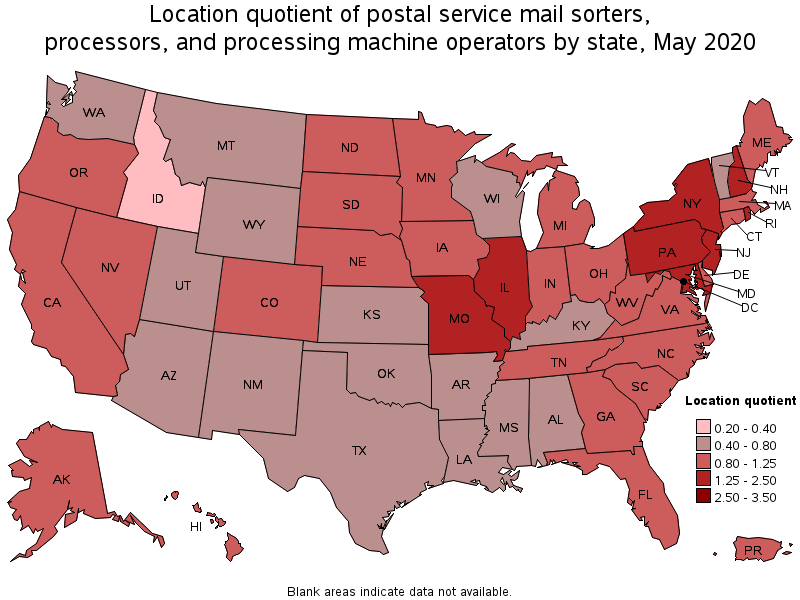
States with the highest concentration of jobs and location quotients in Postal Service Mail Sorters, Processors, and Processing Machine Operators:
| State | Employment (1) | Employment per thousand jobs | Location quotient (9) | Hourly mean wage | Annual mean wage (2) |
|---|---|---|---|---|---|
| Rhode Island | 640 | 1.45 | 1.92 | $ 24.31 | $ 50,570 |
| New Jersey | 4,860 | 1.29 | 1.70 | $ 25.20 | $ 52,420 |
| Illinois | 6,320 | 1.12 | 1.48 | $ 23.93 | $ 49,780 |
| New Hampshire | 680 | 1.10 | 1.45 | $ 24.25 | $ 50,440 |
| Pennsylvania | 5,720 | 1.04 | 1.37 | $ 25.03 | $ 52,050 |
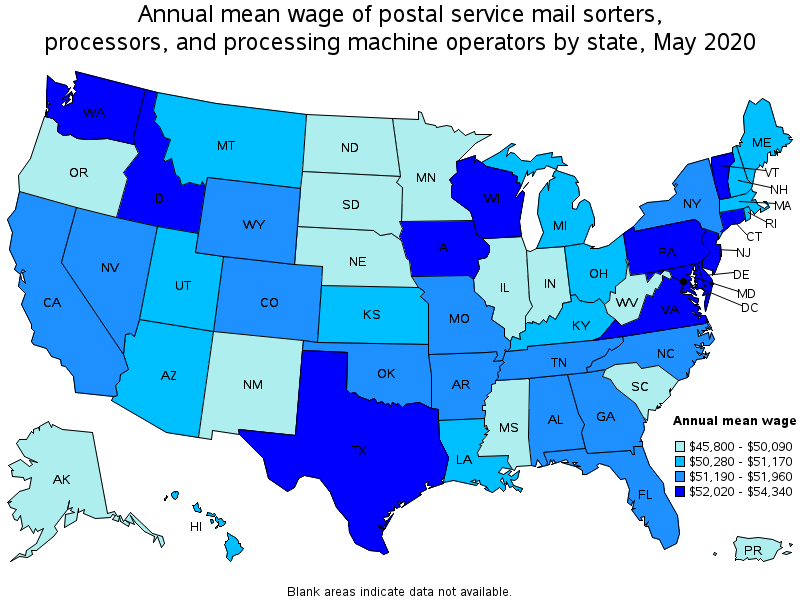
Top paying states for Postal Service Mail Sorters, Processors, and Processing Machine Operators:
| State | Employment (1) | Employment per thousand jobs | Location quotient (9) | Hourly mean wage | Annual mean wage (2) |
|---|---|---|---|---|---|
| District of Columbia | 540 | 0.79 | 1.04 | $ 26.13 | $ 54,340 |
| Idaho | 210 | 0.29 | 0.38 | $ 26.05 | $ 54,180 |
| Washington | 1,820 | 0.57 | 0.75 | $ 25.78 | $ 53,620 |
| Texas | 6,250 | 0.52 | 0.68 | $ 25.62 | $ 53,280 |
| Maryland | 2,400 | 0.95 | 1.25 | $ 25.32 | $ 52,660 |
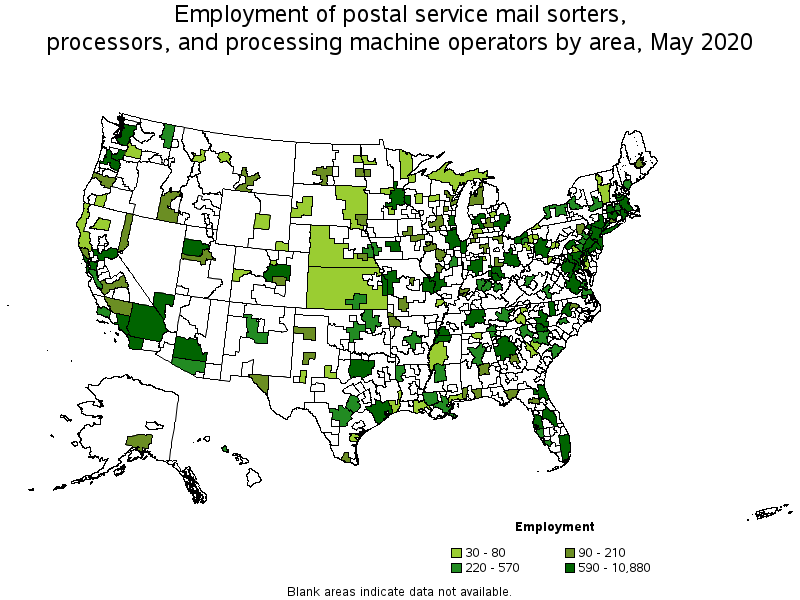
Metropolitan areas with the highest employment level in Postal Service Mail Sorters, Processors, and Processing Machine Operators:
| Metropolitan area | Employment (1) | Employment per thousand jobs | Location quotient (9) | Hourly mean wage | Annual mean wage (2) |
|---|---|---|---|---|---|
| New York-Newark-Jersey City, NY-NJ-PA | 10,880 | 1.23 | 1.63 | $ 25.07 | $ 52,140 |
| Los Angeles-Long Beach-Anaheim, CA | 5,860 | 1.01 | 1.33 | $ 24.19 | $ 50,320 |
| Chicago-Naperville-Elgin, IL-IN-WI | 5,800 | 1.33 | 1.75 | $ 23.83 | $ 49,570 |
| Philadelphia-Camden-Wilmington, PA-NJ-DE-MD | 2,890 | 1.07 | 1.41 | $ 25.84 | $ 53,750 |
| Dallas-Fort Worth-Arlington, TX | 2,840 | 0.79 | 1.05 | $ 26.42 | $ 54,950 |
| Washington-Arlington-Alexandria, DC-VA-MD-WV | 2,580 | 0.85 | 1.13 | $ 25.93 | $ 53,940 |
| Detroit-Warren-Dearborn, MI | 2,460 | 1.38 | 1.82 | $ 24.70 | $ 51,370 |
| San Francisco-Oakland-Hayward, CA | 2,360 | 1.01 | 1.34 | $ 26.24 | $ 54,580 |
| Atlanta-Sandy Springs-Roswell, GA | 2,330 | 0.88 | 1.17 | $ 24.82 | $ 51,630 |
| Minneapolis-St. Paul-Bloomington, MN-WI | 2,130 | 1.15 | 1.52 | $ 23.85 | $ 49,610 |
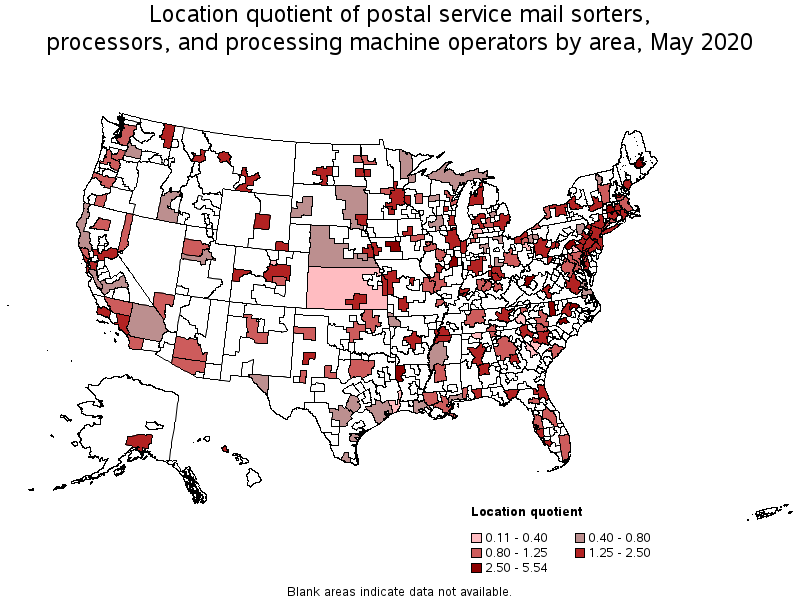
Metropolitan areas with the highest concentration of jobs and location quotients in Postal Service Mail Sorters, Processors, and Processing Machine Operators:
| Metropolitan area | Employment (1) | Employment per thousand jobs | Location quotient (9) | Hourly mean wage | Annual mean wage (2) |
|---|---|---|---|---|---|
| Charleston, WV | 430 | 4.20 | 5.54 | $ 22.76 | $ 47,340 |
| Springfield, MA-CT | 1,110 | 3.65 | 4.82 | $ 23.63 | $ 49,140 |
| Manchester, NH | 310 | 2.81 | 3.71 | $ 24.51 | $ 50,970 |
| Greensboro-High Point, NC | 890 | 2.56 | 3.38 | $ 25.10 | $ 52,210 |
| Trenton, NJ | 590 | 2.54 | 3.35 | $ 26.01 | $ 54,100 |
| Fayetteville, NC | 310 | 2.49 | 3.29 | $ 23.31 | $ 48,480 |
| Harrisburg-Carlisle, PA | 760 | 2.43 | 3.21 | $ 23.77 | $ 49,450 |
| Des Moines-West Des Moines, IA | 850 | 2.39 | 3.16 | $ 25.38 | $ 52,790 |
| Champaign-Urbana, IL | 220 | 2.25 | 2.97 | $ 24.25 | $ 50,440 |
| Shreveport-Bossier City, LA | 350 | 2.14 | 2.82 | $ 23.38 | $ 48,630 |
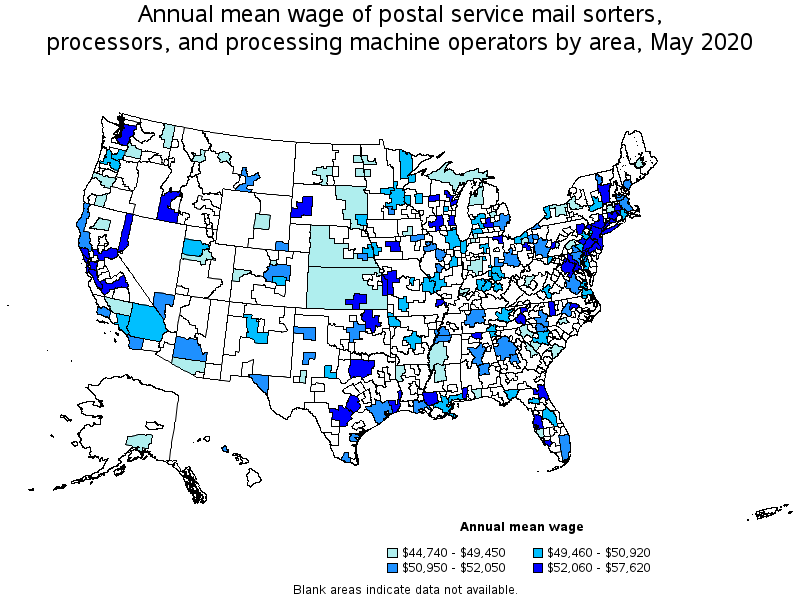
Top paying metropolitan areas for Postal Service Mail Sorters, Processors, and Processing Machine Operators:
| Metropolitan area | Employment (1) | Employment per thousand jobs | Location quotient (9) | Hourly mean wage | Annual mean wage (2) |
|---|---|---|---|---|---|
| Wausau, WI | 40 | 0.55 | 0.73 | $ 27.70 | $ 57,620 |
| Cape Girardeau, MO-IL | 40 | 0.83 | 1.10 | $ 26.77 | $ 55,670 |
| Canton-Massillon, OH | 30 | 0.20 | 0.26 | $ 26.69 | $ 55,520 |
| Dallas-Fort Worth-Arlington, TX | 2,840 | 0.79 | 1.05 | $ 26.42 | $ 54,950 |
| Beaumont-Port Arthur, TX | 40 | 0.26 | 0.34 | $ 26.29 | $ 54,680 |
| Scranton--Wilkes-Barre--Hazleton, PA | 130 | 0.55 | 0.72 | $ 26.25 | $ 54,590 |
| Seattle-Tacoma-Bellevue, WA | 1,430 | 0.73 | 0.96 | $ 26.24 | $ 54,590 |
| San Francisco-Oakland-Hayward, CA | 2,360 | 1.01 | 1.34 | $ 26.24 | $ 54,580 |
| Madison, WI | 210 | 0.56 | 0.74 | $ 26.22 | $ 54,530 |
| Baton Rouge, LA | 230 | 0.62 | 0.82 | $ 26.03 | $ 54,140 |
Nonmetropolitan areas with the highest employment in Postal Service Mail Sorters, Processors, and Processing Machine Operators:
| Nonmetropolitan area | Employment (1) | Employment per thousand jobs | Location quotient (9) | Hourly mean wage | Annual mean wage (2) |
|---|---|---|---|---|---|
| Northwest Lower Peninsula of Michigan nonmetropolitan area | 100 | 0.94 | 1.25 | $ 22.08 | $ 45,930 |
| Southern Vermont nonmetropolitan area | 80 | 0.84 | 1.11 | $ 25.17 | $ 52,350 |
| Maryland nonmetropolitan area | 80 | 1.35 | 1.78 | $ 24.39 | $ 50,730 |
| South Nebraska nonmetropolitan area | 60 | 0.38 | 0.50 | $ 23.13 | $ 48,110 |
| Upper Peninsula of Michigan nonmetropolitan area | 50 | 0.45 | 0.60 | $ 23.44 | $ 48,760 |
Nonmetropolitan areas with the highest concentration of jobs and location quotients in Postal Service Mail Sorters, Processors, and Processing Machine Operators:
| Nonmetropolitan area | Employment (1) | Employment per thousand jobs | Location quotient (9) | Hourly mean wage | Annual mean wage (2) |
|---|---|---|---|---|---|
| Maryland nonmetropolitan area | 80 | 1.35 | 1.78 | $ 24.39 | $ 50,730 |
| Northwest Lower Peninsula of Michigan nonmetropolitan area | 100 | 0.94 | 1.25 | $ 22.08 | $ 45,930 |
| Southern Vermont nonmetropolitan area | 80 | 0.84 | 1.11 | $ 25.17 | $ 52,350 |
| Upper Peninsula of Michigan nonmetropolitan area | 50 | 0.45 | 0.60 | $ 23.44 | $ 48,760 |
| South Nebraska nonmetropolitan area | 60 | 0.38 | 0.50 | $ 23.13 | $ 48,110 |
Top paying nonmetropolitan areas for Postal Service Mail Sorters, Processors, and Processing Machine Operators:
| Nonmetropolitan area | Employment (1) | Employment per thousand jobs | Location quotient (9) | Hourly mean wage | Annual mean wage (2) |
|---|---|---|---|---|---|
| Southern Vermont nonmetropolitan area | 80 | 0.84 | 1.11 | $ 25.17 | $ 52,350 |
| North Coast Region of California nonmetropolitan area | 30 | 0.32 | 0.42 | $ 24.70 | $ 51,370 |
| Maryland nonmetropolitan area | 80 | 1.35 | 1.78 | $ 24.39 | $ 50,730 |
| Upper Peninsula of Michigan nonmetropolitan area | 50 | 0.45 | 0.60 | $ 23.44 | $ 48,760 |
| Kansas nonmetropolitan area | 30 | 0.08 | 0.11 | $ 23.27 | $ 48,410 |
These estimates are calculated with data collected from employers in all industry sectors, all metropolitan and nonmetropolitan areas, and all states and the District of Columbia. The top employment and wage figures are provided above. The complete list is available in the downloadable XLS files.
The percentile wage estimate is the value of a wage below which a certain percent of workers fall. The median wage is the 50th percentile wage estimate—50 percent of workers earn less than the median and 50 percent of workers earn more than the median. More about percentile wages.
(1) Estimates for detailed occupations do not sum to the totals because the totals include occupations not shown separately. Estimates do not include self-employed workers.
(2) Annual wages have been calculated by multiplying the hourly mean wage by a "year-round, full-time" hours figure of 2,080 hours; for those occupations where there is not an hourly wage published, the annual wage has been directly calculated from the reported survey data.
(3) The relative standard error (RSE) is a measure of the reliability of a survey statistic. The smaller the relative standard error, the more precise the estimate.
(9) The location quotient is the ratio of the area concentration of occupational employment to the national average concentration. A location quotient greater than one indicates the occupation has a higher share of employment than average, and a location quotient less than one indicates the occupation is less prevalent in the area than average.
Other OEWS estimates and related information:
May 2020 National Occupational Employment and Wage Estimates
May 2020 State Occupational Employment and Wage Estimates
May 2020 Metropolitan and Nonmetropolitan Area Occupational Employment and Wage Estimates
May 2020 National Industry-Specific Occupational Employment and Wage Estimates
Last Modified Date: March 31, 2021